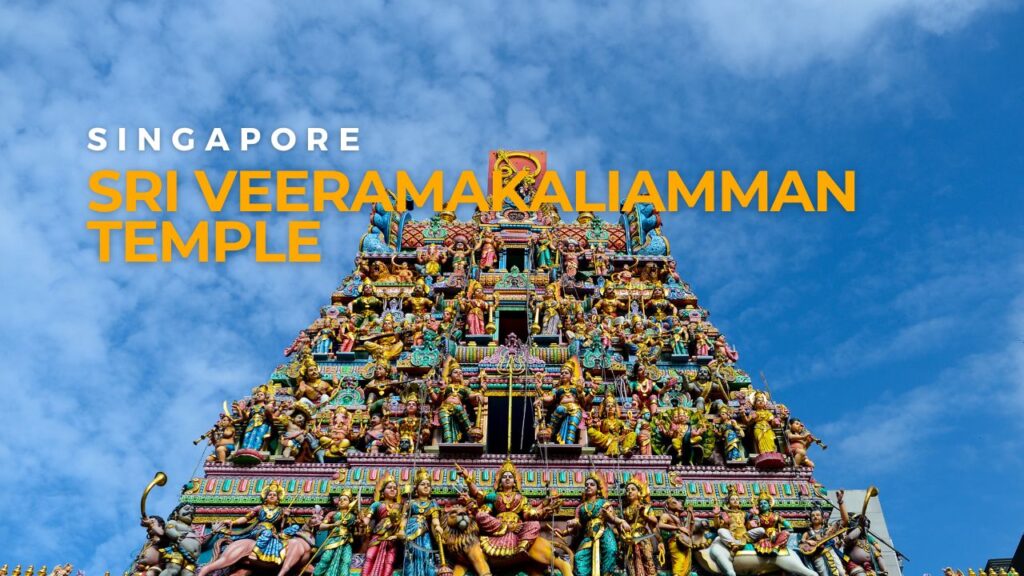Sri Veeramakaliamman Temple: A Guide to Singapore’s Oldest Hindu Temple
Sri Veeramakaliamman Temple, also known as Soonambu Kambam Kovil, is a Hindu temple in the heart of Little India in the southern part of Singapore. Built in 1881, the temple is dedicated to Sri Veeramakaliamman, the Hindu goddess and destroyer of evil. The temple is one of the oldest and most important Hindu temples in Singapore and attracts many local and foreign visitors.

The temple is a beautiful, ornate structure with intricate carvings and colorful decorations. The temple’s main deity, Sri Veeramakaliamman, is adorned with gold jewelry and silk sarees and is a sight to behold. Visitors can also see other deities in the temple, such as Lord Ganesha, Lord Murugan, and Lord Shiva.
Apart from its religious significance, the Sri Veeramakaliamman Temple is also an important cultural landmark in Singapore. It was built by Indian pioneers who came to work and live in Singapore and became a focus of early Indian social and cultural activities in the area. The temple has also played an important role in the history of Singapore and is a testament to the country’s rich cultural heritage.

History and Significance
Origins and Early History
The Sri Veeramakaliamman Temple, formerly known as the Soonambu Kambam Kovil, is one of the oldest Hindu temples in Singapore. It was built in 1881 by Indian settlers, particularly Bengali laborers, who arrived in Singapore seeking employment. The temple was initially a small shrine with carvings and inscriptions, but it was later expanded to become the beautiful architectural marvel it is today.
World War 2 and the Temple
During World War 2, the Sri Veeramakaliamman Temple became a refuge for the local community. The temple was located in the heart of Little India, providing shelter for many people during air raids and bombings. The British colonial government also used the temple as a base for their operations.
Post-War Developments
After the war, the Sri Veeramakaliamman Temple played a vital role in the post-war development of Singapore. The Charities Commissioner, R Selvaraju, and Ratha Krishnan Selvakumar were instrumental in the temple’s development. They helped to raise funds through cheques, loans, and cash loans, which were used for the temple’s disbursements and Indian social-cultural activities. The temple also played a significant role in the settlement patterns of the migrant population in the Serangoon Road area.
Modern Day Significance
Today, the Sri Veeramakaliamman Temple is an important landmark in Little India and a popular tourist attraction. The temple is known for its daily worship and unity among the devotees. It is also famous for its food offerings during festivals. The temple is dedicated to the goddess Kali, the destroyer of evil. Other deities worshipped in the temple include Parvati, Ganesha, and Murugan.

The Temple in Little India
The Sri Veeramakaliamman Temple is located in the heart of Little India, a vibrant and bustling area known for its food, shopping, and cultural activities. The temple is a significant part of the area’s rich cultural heritage and plays a vital role in the local community.
The Temple’s Deities
The Sri Veeramakaliamman Temple is dedicated to the goddess Kali, who is considered the destroyer of evil. The temple also houses other deities, including Parvati, Ganesha, and Murugan, among others. The temple’s priests perform daily worship, and devotees can make donations and book prasatham.

Architecture and Design
The Sri Veeramakaliamman Temple’s architecture is a blend of South Indian Tamil temples and Northeastern Indian Kali temples. The temple features intricate carvings, domes, and a shrine for the goddess Kali. The temple’s design and architecture are a testament to the rich cultural heritage of the Indian community in Singapore.

Worship and Rituals
The Sri Veeramakaliamman Temple’s priests perform daily worship, and devotees can participate in various rituals and ceremonies. The temple is known for its vibrant and colorful festivals, including Navaratri, Thaipusam, and Deepavali. The temple’s devotees believe worshipping the deities brings them peace, prosperity, and good fortune.

Frequently Asked Questions
When was Sri Veeramakaliamman Temple built?
Sri Veeramakaliamman Temple was built in 1881 by Indian pioneers who had settled in Singapore. The temple has undergone several renovations and expansions over the years to accommodate the growing number of devotees.
How old is Sri Veeramakaliamman Temple?
Sri Veeramakaliamman Temple is over 140 years old. It has withstood the test of time and remains a significant landmark in Little India, Singapore.
What is the meaning of Veeramakaliamman?
Veeramakaliamman is a Hindu goddess who is also known as Kali. She is the destroyer of evil and is worshipped for her power and protection.
Is it Sri Veeramakaliamman or Kali?
The temple is dedicated to Sri Veeramakaliamman, who is also known as Kali. Both names are used interchangeably to refer to the goddess worshipped at the temple.
How much is Sri Veeramakaliamman Temple?
Entry to the temple is free for all visitors. However, donations are welcome to support the temple’s maintenance and upkeep.
Sri Veeramakaliamman Temple Wedding Hall – Availability and Cost?
The temple has a wedding hall that is available for rent for Hindu weddings and other ceremonies. The availability and cost of the wedding hall can be obtained by contacting the temple’s management directly.
Singapore Travel and Tour Packages
Want more updates about other Singapore tourist spots? Like, Follow, and Subscribe to OutofTownBlog.com on Facebook, Twitter, Instagram, and Pinterest, and Team out Of Town on YouTube for more Krabi Travel Spots.
Read:

